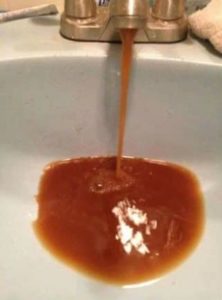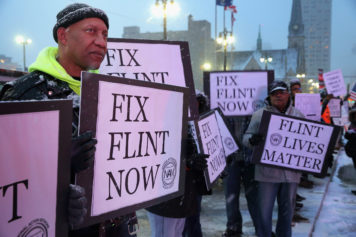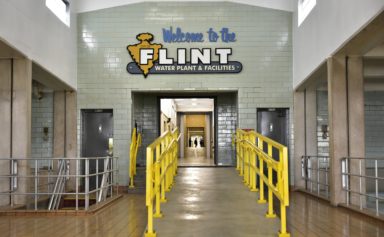
Water in St. Joseph, Louisiana. Image courtesy of resident Janet Thornton.
More than 1,000 miles from the city of Flint, Michigan, the community of St. Joseph, Louisiana, also finds itself in the midst of a crippling water-contamination crisis.
Gov. John Bel Edwards stopped by the small community on Monday, Dec. 19, after last week declaring a public health emergency after two of 13 water samples from the area showed elevated levels of lead, which weren’t present in samples taken earlier this year. Two other samples, both collected at private residences, also showed elevated levels of copper.
The governor’s declaration is a complete about-face from this past spring, when state health officials said the muddy brown water pouring out of city residents’ faucets wasn’t dangerous and residents had nothing to fear.
New Orleans’ Fox 8 News reported that Edwards has since ordered water testing for every residence in the area. The tiny town of just over 1,000 residents has reportedly been experiencing water issues for quite some time.
“St. Joseph has experienced water problems for years due to the poorly maintained and deteriorating water distribution system,” a press release from the governor’s office stated. “Frequent breaks in the water distribution system provide a potential health risk because of the drop in water pressure.”
“It could take years,” State Health Officer Dr. Jimmy Guidry told NPR back in February of St. Joseph’s broken water system, prior to the current contamination crisis. “It’s the kind of thing, which if you don’t maintain it along the way, you are going to have to take care of it when it gets in trouble — and now it’s in serious trouble. And it’s going to be very costly to take care of those issues.”
Both the governor and Louisiana’s Department of Health urged city residents to find new or alternative sources of water for cooking and bathing. Guidry said the state is handing out three liters of drinking water per person per day over the next 30 days as state officials continue collecting and testing samples from all running-water sources.
St. Joseph resident Garrett Boyte told the news site that it’s become common for brown or yellow water to come from his faucets. He also contended that had it not been for widespread coverage of Flint’s water crisis, St. Joseph’s water issue would not have gotten the attention it has.
Two years after the city switched its water supply and began drawing water from the highly contaminated Flint River, residents of the Michigan city are still struggling to get access to clean water. Unfiltered tap water there is still unsafe to drink, with many residents relying on bottled water to cook and bathe. A glimmer of hope came last week, however, when Congress finally approved a $170 million bill dedicated to repairing the city’s lead-contaminated water system.
The people of St. Joseph haven’t gotten so lucky, at least not yet. News of the town’s public health emergency came just days before an investigative report revealed there were nearly 3,000 other towns across America experiencing lead-contamination crises. The report showed that many of these towns had elevated levels of lead and residents didn’t even know it.
“I hope this data spurs questions from the public to community leaders who can make changes,” epidemiologist Robert Walker, co-chair of the CDC’s Lead Content Work Group, told Reuters. “I would think that it would turn some heads.”


